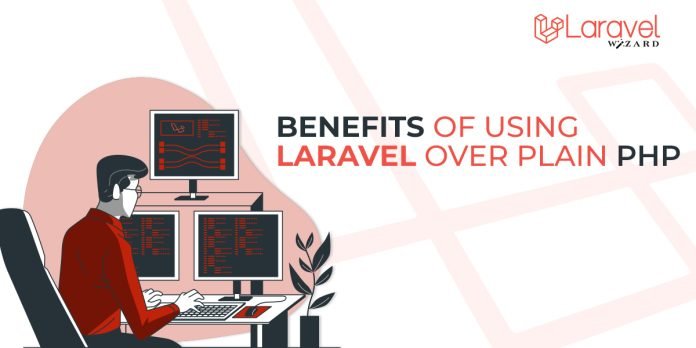Last Updated on January 9, 2024 by Umer Malik
Choosing a front-end framework is not enough to create a successful app. You need an appropriate backend if you want your app to be performant. PHP and Laravel are popular choices when building web apps because they offer quality and performance benefits. Laravel or PHP are popular server-side back enrichment tools that can help with this endeavor, but they come at different costs. PHP is a primary scripting language, and Laravel is a fully-structured PHP-based framework. When choosing between them, make sure to choose wisely, considering their performance.
This blog will help you choose which framework is a perfect fit for your next web app project. We’ve compared key factors of PHP and Laravel Development, like scalability, testing, and community support, so it’s easy to compare them all together.
Go on, Read.
Table of Contents
What is PHP?
Being a scripting language, PHP (Hypertext Preprocessor) automates various tasks on the server side of web development. PHP has the highest number of users globally, with a market share of 28.56%. It is a programming language that easily embeds with HTML codes. PHP enables the creation of dynamic web pages, eCommerce web apps, and database-driven applications. It is an open-source scripting language compatible with MySQL, Oracle, and other database services.
What is Laravel?
Created by Taylor Otwell, Laravel is based on Symfony, which provides reusable PHP components/libraries. Being written in PHP, Laravel is a web framework known for its server-side handling of routing, authentication, and templating. With Laravel, you can create apps with pre-defined architectures, customized backend logic, web portal, templates, and full-stack apps and manage SaaS products. BuiltWith reports that, as of today, almost 1.6 million websites are built using the Laravel framework.
Laravel vs PHP, which is better?
Performance & Speed
Laravel – The community is aware that performance may be slow sometimes, but they believe optimizing the application will significantly improve its speed. Using Cache tags allows applications to quickly load the pre-stored information that permits a faster response time, leading to improved performance.
PHP – PHP offers better performance on higher concurrency. The concurrency relates to the number of devices a language can handle for user request execution. This was an issue in previous versions of PHP, but it has been improved in recent versions.
Application Architecture
Laravel – Laravel supports the Model-View-Controller (MVC) architectural pattern, which means that developers can work on different parts of the code simultaneously. For instance, one developer can work on the front-end views while another works on the backend controller logic.
The MVC patterns offer full control over the application. This includes choosing application-specific routes and customizing how your application appears globally. Laravel’s MVC architecture simplifies implementing external APIs and reusing application code. Thus, it is always possible to create immutable backend support for any web application.
PHP – PHP supports a wide range of frameworks, such as Ubiquity, Zend, Laravel, Codeigniter, and others. These frameworks primarily provide MVC architectures. The model part helps with the application’s data side. The view part extracts data from the model when it receives user requests. The controller part is responsible for handling requests.
Scalability
Laravel – Popular apps that have been using Laravel for years are scaling up their applications without any limitations. Laravel inherits scalability from PHP to assist quickly expanding businesses. Laravel can achieve massive horizontal scaling using a robust database and load balancer. Laravel apps can be scaled as needed by utilizing MySQL, AWS, and some advanced caching techniques.
PHP – PHP is a highly scalable scripting language that can handle small businesses or enterprises. It scales by using an opcode cache and autoloader. The opcode cache saves the interpretation from the first request and applies it to further requests. This way, PHP does not have to recompile the entire code on each interpretation. In addition, the autoloader removes the need to include statements and improves performance on various requests.
Ease of Testing
Laravel – There are many ways to test Laravel applications, given that Laravel is written in PHP. This means many tools are already available to ensure your application doesn’t have any bugs. However, to make things simpler, Laravel has two levels of tests: Unit tests and Feature tests.
Laravel has robust testing documentation and provides all the tools you need to test the application environment, including the ability to run mock tests by mocking application codes and events.
PHP – PHP applications are easy to test when you use scalar-type hinting and return-type declaration. Scalar-type hinting makes the code explicit, and PHP can easily monitor all the data types returned by a function. When you validate the assertion, only one data string is necessary. Return type declarations also help ensure the function’s precision of the return data type. What’s more, it allows you to create an error-free testing environment.
Community
Laravel – While it’s difficult to give an exact number, the Laravel community is thriving and active. There are frequent conferences dedicated to the framework, hosted worldwide. There are countless repositories on GitHub dedicated to the framework and a plethora of tutorials and resources available online. Overall, the Laravel community provides a wealth of support for new developers just starting or experienced professionals looking to expand their skill set.
PHP – One reason for its widespread use is the support from the PHP community. From online forums and documentation to global conferences and local meetups, there are countless resources for developers of all levels to continue learning and improving their skills. The PHP community offers a wealth of resources for experienced coders and newcomers alike to learn and grow as developers.
Conclusion
PHP and Laravel are both well-suited frameworks for developing PHP-based web applications. PHP development solutions may seem more straightforward, whereas Laravel provides greater diversity in terms of tools and resources, making it more dependable. As Laravel development company experts, our professionals make sure that you get end-to-end customized solutions.
Choose Laravel, if:
- You want to create interactive website layouts with appealing content.
- You’ll need a well-documented framework as well as ongoing community help.
- Your project aims to create a web application as quickly as possible using object-oriented libraries.
- You want to build apps with built-in PHP Data Objects (PDO) security that automatically eliminates SQL injections and CSRF attacks.






















